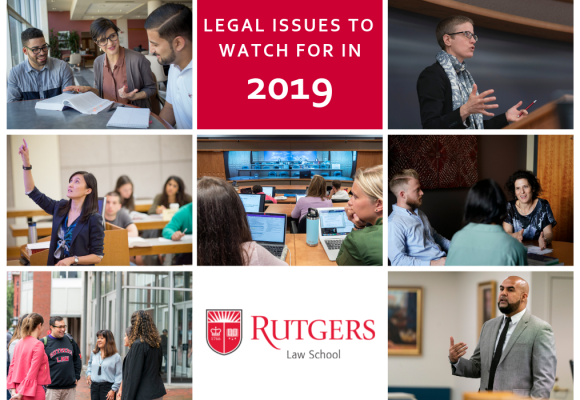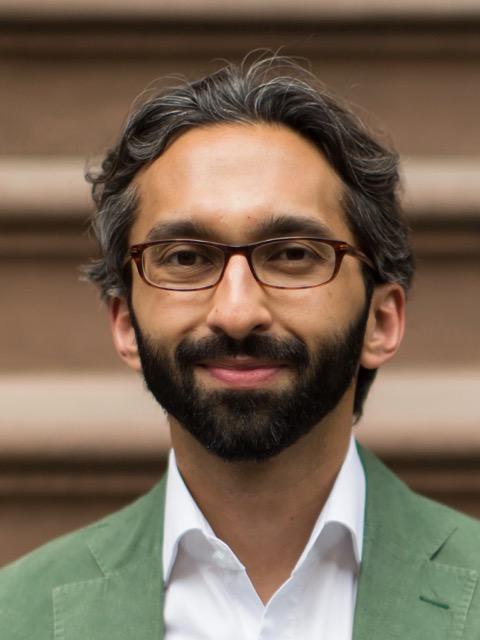
Rutgers Law asked its faculty members to forecast some of the key legal issues that will be discussed and debated in the upcoming year. From opioid litigation to data privacy, here are just a few of the legal developments to watch for in 2019.

Michael A. Carrier
Distinguished Professor of Law
U.S. consumers suffer every day from high drug prices. One main reason is the anticompetitive games drug companies play. Brand firms have (1) paid generics to stay off the market, (2) made trivial changes to drugs, (3) denied samples generics need to enter the market, and (4) filed frivolous petitions with the FDA. Another hot topic is the relationship between patents and antitrust. The head of the Antitrust Division has claimed that patent holders cannot violate the antitrust laws even if they break promises that an industry relies on. Will the courts and the rest of the world follow? We’ll find out in 2019.

Katie Eyer
Professor of Law
A major issue that has been developing in the lower courts is whether or not anti-LGBT discrimination should be considered sex discrimination under Title VII. While there is no federal law that explicitly includes “sexual orientation” and “gender identity” as protected categories, lower courts have increasingly found that anti-LGBT discrimination is, necessarily, also sex discrimination.
For example, a gay employee who is fired because he married a man would not have been fired if he were a woman who was engaged in identical conduct, i.e., marrying a man. This is literally discrimination “because of sex,” which is prohibited by the statute. There are three petitions for certiorari that have been pending at the Supreme Court on this issue, and which the Justices have repeatedly rescheduled to a future conference (sometimes a sign they are likely to grant a case, and almost always a sign they are having difficulty deciding whether to grant). Even if the Supreme Court does not grant certiorari, this is an issue on which we are sure to see continued developments in the lower courts in the upcoming year.
Steve Gold
Professor of Law and Judge Raymond J. Dearie Scholar
Since its first day, the Trump Administration has engaged in a full-scale effort to deconstruct federal environmental policy. Although Congressional attempts to repeal or amend the environmental statutes failed, EPA and other agencies are rescinding or rewriting the regulations that implement the statutes. Some of these changes would depart from decades of settled understanding of environmental law. Many are being made in ways that seem to deviate from accepted norms of administrative law.
In 2019, we should watch for the outcomes of court challenges to these regulatory changes. Will the courts require a deregulation-minded executive branch to implement statutes as written, to provide reasoned justifications for its decisions, and to comply with procedural requirements? Will politically conservative judges, who recently began to question the idea of deferring to agencies' statutory interpretations, rediscover deference when reviewing the actions of a politically conservative Administration?

Ellen P. Goodman
Professor of Law
Look out for federal data privacy and “social bot” legislation in 2019. Last year, California passed a comprehensive data privacy protection law and a law requiring that bots used to amplify messaging on social media disclose that they are in fact not human in certain contexts. Similar kinds of legislation has been introduced in Congress and we can expect that these sorts of laws will progress in 2019. These will be part of larger attempts to regulate big tech platforms to increase data privacy and security and to make those platforms more democratically accountable.

Adil Haque
Professor of Law and Judge Jon O. Newman Scholar
The International Criminal Court is expected to finally decide whether Omar Al Bashir, the President of Sudan, must be arrested and surrendered to the Court should he step foot in one of the Court's 123 member states. The United Nations Security Council gave the Court jurisdiction over the situation in the Darfur region of Sudan in 2005, and the Court's Pretrial Chamber issued warrants for Al Bashir's arrest on charges of genocide, crimes against humanity, and war crimes in 2010. Nevertheless, Al Bashir remains at large. Several ICC member states have allowed Al Bashir to visit their territory, and refused to arrest him on the grounds that he enjoys immunity from arrest as a sitting head of state. The Prosecution argues that whatever immunity Al Bashir might enjoy under general international law was displaced by the Security Council's referral of the Darfur situation to the Court. The Appeals Chamber held hearings on the question last September, and will likely decide the matter in 2019.

Stacy Hawkins
Professor of Law
One case/trend worth watching next year is the battle over affirmative action in higher education admissions. Specifically, the federal trial judge in Boston will issue a decision in the Harvard case sometime next year (likely earlier rather than later given that the trial wrapped up in November), and it is almost a certainty that the decision will be appealed to the 1st Circuit regardless of who wins, with an ultimate objective (especially on behalf of the plaintiffs/challengers) of sending this issue back to the Supreme Court. With Kavanaugh’s replacement of Kennedy on the Court, the challengers now have a much better chance of finally getting a favorable ruling on this issue after 15 years of trying.
David Noll
Associate Professor of Law
In January 2018, Dan Polster, the federal district judge presiding over the massive opioids multidistrict litigation, announced in open court that he wanted the litigation resolved by year’s end. Around 150 Americans were dying from opioid overdoses every day. Polster wanted “to do something meaningful to abate this crisis and to do it in 2018.” Things did not work out as he planned. Although the parties agreed to a set of reforms to how opiods are marketed and distributed, divisions over the viability of the plaintiffs’ legal theories and financial responsibility for the opioids crisis impeded a grand bargain that would resolve the litigation. To break the logjam, Polster scheduled a set of bellwether trials that are set to begin in September 2019.
The trials will make public crucial information about who knew what and when about the opiods crisis. As they progress, I'll be watching to see who wins and loses. Just as important is how the trials are covered in the press, and how they impact the defendants’ financials. As the stakes become progressively higher, pressure to deliver an innovative legal solution to the opioids crisis will be extreme.

Robert F. Williams
Distinguished Professor of Law
The United States Supreme Court now includes two of President Trump’s nominees, with the possibility of more. Many of his federal court nominees have been confirmed. As a consequence, many constitutional litigators seeking progressive decisions will likely turn their sights toward the state constitutions, as interpreted by state supreme courts. State constitutions contain all of the familiar rights guaranteed by the US Constitution, but also a number of less-well-recognized rights. State judicial decisions based on the state charters provide important victories, but only in a single state and are subject to possible reversal by state constitutional amendments.
By contrast, constitutional litigators seeking conservative decisions (gun rights, abortion restrictions) will likely favor federal constitutional claims in federal court, with an eye toward national victories in the U.S. Supreme Court.